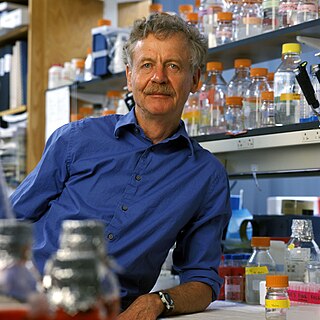
Bonnie Lynn Bassler is an American molecular biologist; the Squibb Professor in Molecular Biology and chair of the Department of Molecular Biology at Princeton University; and a Howard Hughes Medical Institute Investigator. She has researched cell-to-cell chemical communication in bacteria and discovered key insights into the mechanism by which bacteria communicate, known as quorum sensing. She has contributed to the idea that disruption of chemical signaling can be used as an antimicrobial therapy.

Rudolf Jaenisch is a Professor of Biology at MIT and a founding member of the Whitehead Institute for Biomedical Research. He is a pioneer of transgenic science, in which an animal’s genetic makeup is altered. Jaenisch has focused on creating genetically modified mice to study cancer, epigenetic reprogramming and neurological diseases.
Elliot Meyerowitz is an American biologist.

Franklin Gerardus "Frank" Grosveld, FRS is a Dutch molecular biologist whose research interests are in the regulation of transcription during development with a particular emphasis on mammalian erythroid differentiation. He is a professor and former Head of the Department of Cell Biology at the Erasmus MC, Rotterdam.

Denis Duboule is a Swiss-French biologist. He earned his PhD in Biology in 1984 and is currently Professor of Developmental Genetics and Genomics at the École polytechnique fédérale de Lausanne (EPFL) and at the Department of Genetics and Evolution of the University of Geneva. Since 2001, he is the Director of the Swiss National Research Center "Frontiers in Genetics" and since 2017, he is also a professor at the Collège de France. He has notably worked on Hox genes, a group of genes involved in the formation of the body plan and of the limbs.

Aviv Regev is a computational biologist and systems biologist and Executive Vice President and Head of Genentech Research and Early Development in Genentech/Roche. She is a core member at the Broad Institute of MIT and Harvard and professor at the Department of Biology of the Massachusetts Institute of Technology. Regev is a pioneer of single cell genomics and of computational and systems biology of gene regulatory circuits. She founded and leads the Human Cell Atlas project, together with Sarah Teichmann.

Johannes (Hans) Carolus Clevers is a Dutch molecular geneticist, cell biologist and stem cell researcher. He became the Head of Pharma, Research and Early Development, and a member of the Corporate Executive Committee, of the Swiss healthcare company Roche in 2022. Previously, he headed a research group at the Hubrecht Institute for Developmental Biology and Stem Cell Research and at the Princess Máxima Center; he remained as an advisor and guest scientist or visiting researcher to both groups. He is also a Professor in Molecular Genetics at Utrecht University.
Roeland "Roel" Nusse is a professor at Stanford University and an investigator at the Howard Hughes Medical Institute. His research was seminal in the discovery of Wnt signaling, a family of pleiotropic regulators involved in development and disease.

Lucy Shapiro is an American developmental biologist. She is a professor of Developmental Biology at the Stanford University School of Medicine. She is the Virginia and D.K. Ludwig Professor of Cancer Research and the director of the Beckman Center for Molecular and Genetic Medicine.

Piet Gros is a Dutch chemist and professor biomacromolecular crystallography at Utrecht University. In 2010 he received the NWO Spinoza Prize for the elucidation of the three-dimensional structure of the C3 protein, which plays a central role in the complement system and contributes to innate immunity.

Tjitske Nienke"Cisca"Wijmenga is a Dutch professor of Human Genetics at the University of Groningen and the University Medical Center Groningen. She was Rector Magnificus of the University between September 2019 and September 2023.

René Bernards is a Dutch cancer researcher. He is professor of molecular carcinogenesis at Utrecht University and head of the section of molecular carcinogenesis at the Netherlands Cancer Institute-Antoni van Leeuwenhoekziekenhuis. Bernards is a winner of the 2005 Spinoza Prize.
Dirk Bootsma was a Dutch geneticist. He was a professor at Erasmus University Rotterdam from 1969 and 2002. He and his research group discovered the cause of chronic myelogenous leukemia and furthered the understanding of the nucleotide excision repair.
Elly Margaret Tanaka is a biochemist and Scientific Director at the Institute of Molecular Biotechnology of the Austrian Academy of Sciences (IMBA) in Vienna, Austria. Tanaka studies the molecular cell biology of limb and spinal cord regeneration as well as the evolution of regeneration.

Marileen Dogterom is a Dutch biophysicist and professor at the Kavli Institute of Nanoscience at Delft University of Technology. She published in Science, Cell, and Nature and is notable for her research of the cell cytoskeleton. For this research, she was awarded the 2018 Spinoza Prize.

Jan Carel Zadoks is a Dutch botanist and a professor emeritus of ecological plant pathology at Wageningen University & Research.
Albert"Ab"van Kammen was a Dutch molecular biologist and virologist. He was a professor of molecular biology at Wageningen University and Research between 1972 and 1996.

Jan Hendrik Jozef Hoeijmakers is a Dutch molecular biologist, biochemist, and molecular geneticist.
Reuven Agami is a Dutch cancer researcher. He is a professor of Oncogenomics at Erasmus University Rotterdam and head of the section of Oncogenomics at the Netherlands Cancer Institute-Antoni van Leeuwenhoekziekenhuis. Since October 2023 the Royal Netherlands Academy of Arts and Sciences (KNAW) has selected Reuven Agami as a member.

Marcel Dicke is a Dutch professor of entomology who has been affiliated with Wageningen University since 2002. He conducts research on insects and has published in the scientific journals Science and Nature. Dicke received the Spinoza Prize in 2007 for his research on the interactions between plants and insects.














